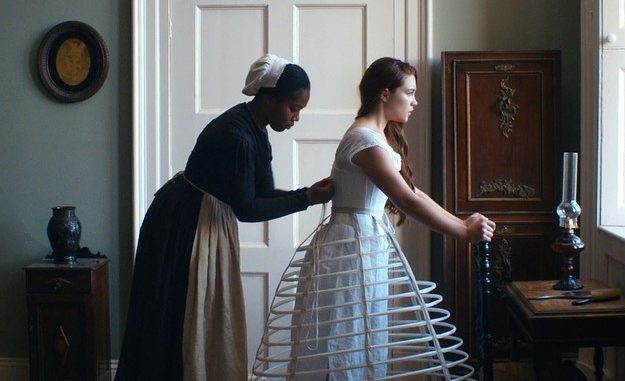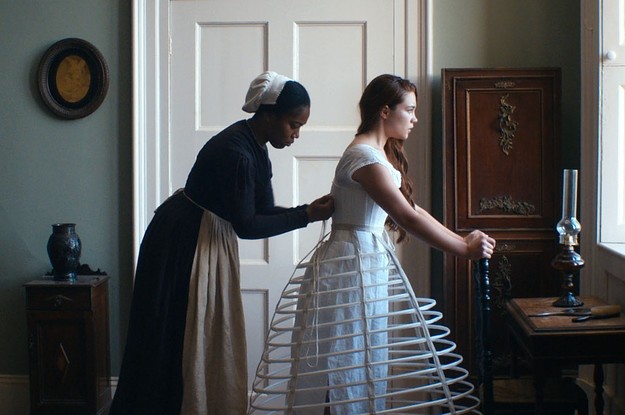

Roadside Attractions
Anna (Naomi Ackie) and Katherine (Florence Pugh) in Lady Macbeth.
After she’s married, Katherine (Florence Pugh) starts each day being woken up and cinched into a corset and cage crinoline. Then she’s helped into a dress — her signature frock is cobalt blue and pinned with a brooch at the neck. And then she sits on a settee in a parlor in sleepy, stupefying boredom, watching the clock tick away until she can go through the whole dressing process in reverse and then find out if her husband, Alexander (Paul Hilton), will try to impregnate her that night.
Alexander is a stranger to her, a man old enough to be her father and one who treats her with open contempt. He’s the browbeaten child of a tyrannical landowner named Boris (Christopher Fairbank), and he baldly reminds Katherine that his father bought her to bear heirs to his son. In that, Boris is out of luck — aside from some brusque acts of sexual humiliation, Alexander hasn’t touched his child bride.
Katherine’s is a miserable, oppressive Victorian existence, one in which she’s treated as the equivalent of both an ignored ornament and a brood animal. But as the title of her movie, Lady Macbeth, suggests, Katherine is ready to wreck some shit. The film is a corrosive, intelligent costume drama from first-time director William Oldroyd, and it isn’t Shakespearean at all — it’s based on a Russian novella by Nikolai Leskov, though the action’s been transported over to 1800s Northumberland.
Katherine soon sets about kicking down patriarchal dictates and chasing her own budding desires with an admirable recklessness. Her rage is glorious, incandescent, and entirely self-concerned — she’s perfectly comfortable stepping on the necks of those she outranks or, if need be, stepping over their dead bodies. And in Lady Macbeth, while it’s white men to whom the world belongs, the people whom Katherine has power over are mostly black.
Roadside Attractions
Katherine (Pugh) on her wedding day.
It’s a coincidence that Lady Macbeth arrives in theaters so soon after Sofia Coppola’s exquisite, myopic The Beguiled, a historical drama that takes place during roughly the same time period in Civil War–torn Virginia. But it’s a serendipitous one. The Beguiled, after all, has been criticized for its decision to excise a slave character (a choice director Sofia Coppola recently defended) and, in doing so, to effectively exclude race from its depiction of the dynamics of a group of genteel Southern women who take in a wounded Union soldier. Lady Macbeth does the opposite, inserting race into a 19th-century England so habitually portrayed as all white onscreen that projects about actual famous figures of color from the era have had trouble getting made.
The sketch Lady Macbeth offers of a rural society divided into strata on the basis of race as well as gender and class gives the film a contemporary-feeling jolt, though maybe it shouldn’t — as Oldroyd has pointed out, assumptions about the era’s racial uniformity have more to do with traditions in media than historical research. Race is never mentioned out loud in Lady Macbeth. Very little is mentioned out loud in Lady Macbeth, a movie fond of beautiful static shots to foment a sense of claustrophobia and long silences under which emotions roils. But it’s there onscreen, complicating the story of its antihero’s struggle to carve out a better life for herself at the cost of those intended to use her, and those she ends up using.
Roadside Attractions
Anna (Naomi Ackie) and Katherine (Pugh).
It’s there, in particular, in the form of Anna (Naomi Ackie), the long-suffering maid whose responsibility it is to tend to Katherine. Anna is Katherine’s most frequent companion, the person tasked with yanking Katherine’s corset tight in the morning and sitting up with her in the evening to keep her awake for her indifferent husband. And yet the power is entirely on Katherine’s side.
When Katherine begins testing the boundaries of her circumscribed wedded life during a giddy window of liberation when both Boris and Alexander are traveling, she discovers that no one else has authority over her, though they might have to shoulder the blame and face consequences for her behavior. She starts small, taking walks on the moors when she’s been told to stay inside and drinking all of Boris’s favorite wine, but her insurrections escalate into taking a lover and, not long afterward, murder.
And through it all, Anna is there, Katherine delighting in all but daring the servant to inform the world about her various delinquencies, and to face whatever the consequences might be for defying the progressively more frightening young woman she answers to.
Roadside Attractions
Katherine (Pugh) and Sebastian (Cosmo Jarvis).
Katherine allows the handsome, brutish, ethnically ambiguous groomsman Sebastian (Cosmo Jarvis) into her bed and lets Anna discover her nude in the morning, basking in satisfaction at her own boldness. Anna has more reasons to be shocked than her young mistress’s open, giggling infidelity — Sebastian was one of the workers on the estate who, not long before, got a laugh out of stripping Anna and hoisting her like a pig for weighing, with rape strongly implied.
Sebastian first caught Katherine’s eye when she put a stop to the incident, not out of concern for her maid but because she wanted to flex her power by telling the men they were wasting her husband’s money by fooling around. It’s one grim little meet-cute, and meanwhile Anna hurries away to weep on the stairs, with no expectation of justice meted on her behalf.
Katherine is an impetuous girl who starts blowing things up because she can, and who becomes truly terrifying and tragic only when the idea of a happy ending, a previous impossibility in her dire situation, flits tantalizingly if improbably into view. Pugh, who’s now 21, is blisteringly great in her breakout role, fascinating and unlikable and oh so young — the lady of the house as defiant teenager.
Roadside Attractions
Katherine (Pugh) and Boris (Christopher Fairbank).
When Boris berates his daughter-in-law for her poorly hidden affair, he sounds like nothing so much as an enraged dad yelling at his recalcitrant kid — “Do you have any idea of the damage you’re capable of doing to this family?” he roars. He might as well be handing her the keys to the castle in reminding her that it’s in everyone else’s best interests to affirm her blamelessness. She might get degraded and treated like an object, but she enjoys a level of societal protection that Anna never has.
Like The Beguiled, Lady Macbeth is about power and the performed innocence of white womanhood. But in enriching its drama with race, Oldroyd’s film demonstrates just how much Coppola’s missed out on in contorting itself in its attempts to make gender dynamics its only axis. Lady Macbeth‘s main character slides from exhilarating outrageousness to painful monstrousness, a journey that’s illuminated by how her resentment at her own mistreatment fails to give her any empathy to those she in turn mistreats — to Anna, to later arrivals Agnes (Golda Rosheuvel) and Teddy (Anton Palmer), and even to Sebastian, who starts to pull away from his aristocratic lover when her demands get more ruthless. Katherine’s acts of go-girl vengeance are soured not just by their increasing viciousness, but by the way she flexes the advantages she has over others.
Roadside Attractions
Which is an idea that’s never better summed up than in the sequence in which Katherine murders her father-in-law, poisoning him at breakfast and then serenely barricading him in another room to die. Anna is with her the entire time, Katherine ordering her to sit, trembling, and make small talk over the sounds of Boris in agony. It’s a shoot-the-moon approach to homicide, so hilariously outrageous that no one could believe in her guilt, but the giddy audacity of Katherine’s act is mitigated by Anna’s obvious trauma at being made an unwilling accomplice.
Katherine has such confidence in the other woman’s comparative powerlessness and vulnerability that she renders Anna mute through seeming sheer strength of will, unable to spill Katherine’s secrets or to defend herself. The empowerment Katherine finds at that moment literally comes at the cost of a black woman’s voice — an act of silencing that could be a critique of Coppola’s act of erasure.
Got a confidential tip? Submit it here.

